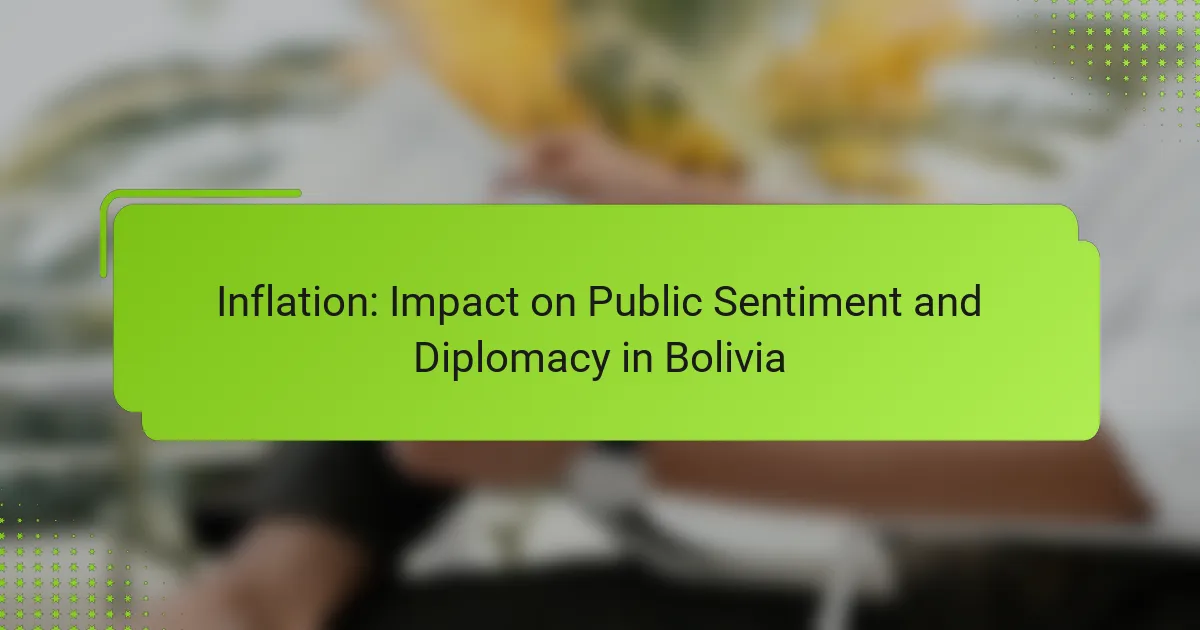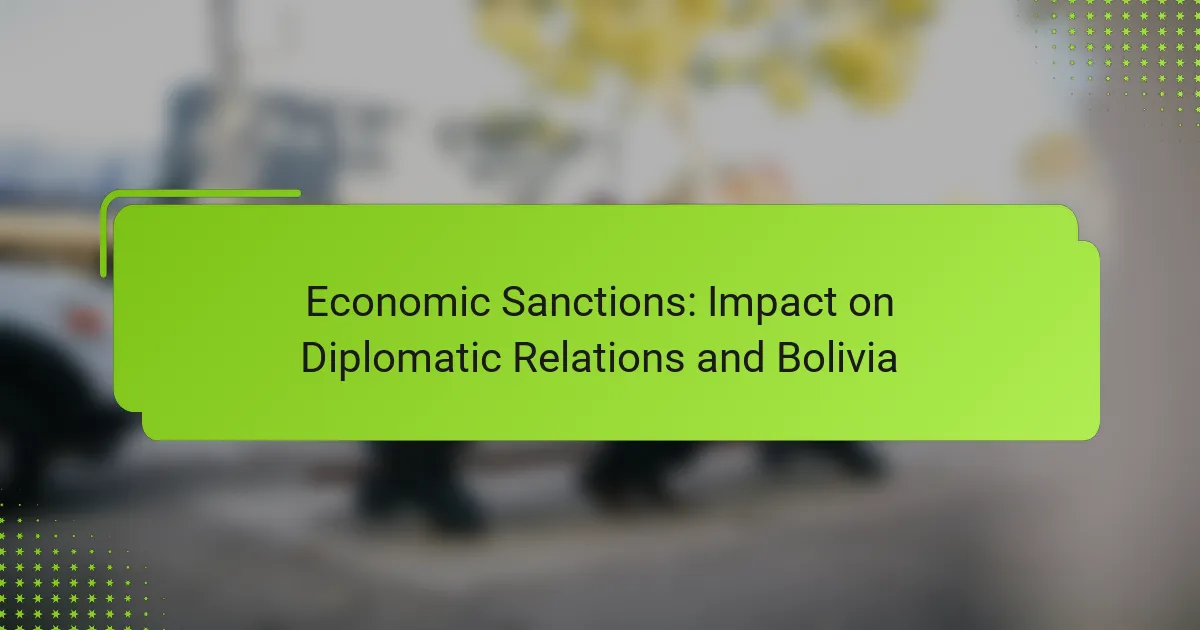Inflation in Bolivia has profound effects on public sentiment, heightening economic anxiety and eroding trust in political institutions as citizens grapple with rising prices. This economic instability not only fuels domestic dissatisfaction but also poses significant challenges for the country’s diplomatic relations, impacting trade agreements and foreign aid. In response, the Bolivian government is actively pursuing strategies to mitigate inflation’s effects and restore public confidence.
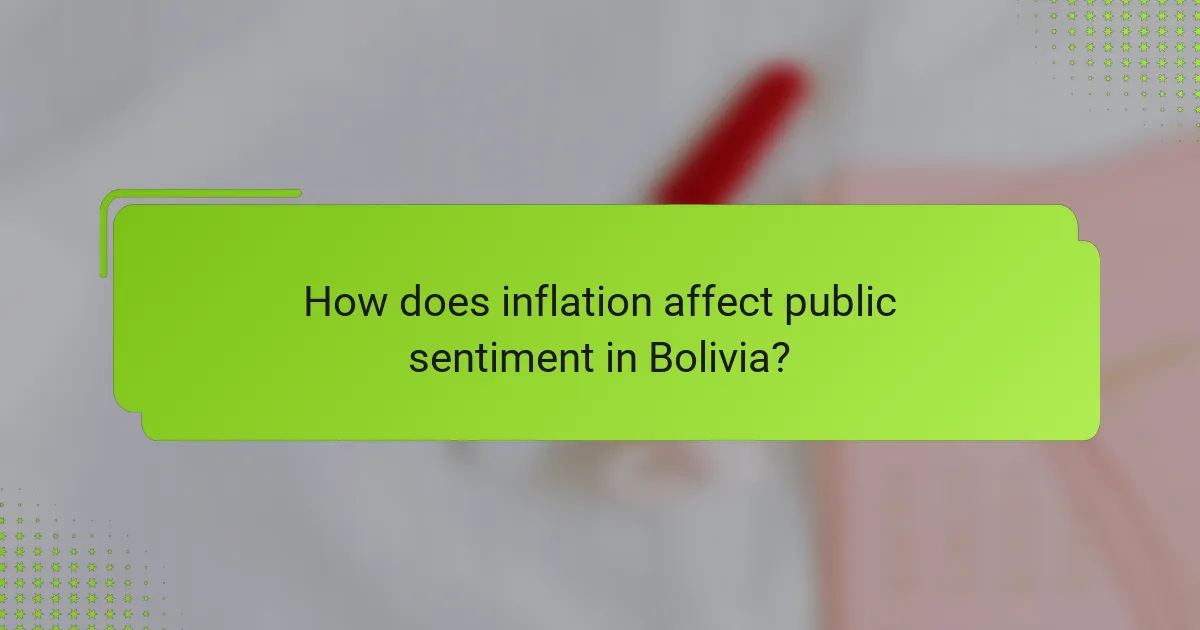
How does inflation affect public sentiment in Bolivia?
Inflation significantly impacts public sentiment in Bolivia by increasing economic anxiety and altering perceptions of political trust. As prices rise, citizens often feel the strain on their finances, leading to heightened dissatisfaction with the government and social unrest.
Increased economic anxiety
As inflation escalates, Bolivians experience increased economic anxiety due to rising costs of living. Basic necessities such as food, fuel, and housing become more expensive, straining household budgets and reducing disposable income.
This financial pressure can lead to a sense of uncertainty about the future, prompting individuals to cut back on spending and savings. Many families may find it challenging to maintain their previous standard of living, which exacerbates feelings of insecurity.
Shift in political trust
Inflation can lead to a significant shift in political trust among the Bolivian populace. When citizens perceive that their government is unable to manage the economy effectively, they may lose faith in political leaders and institutions.
This erosion of trust can manifest in decreased support for ruling parties and increased popularity for opposition groups that promise economic reforms. Citizens may demand accountability and transparency, leading to political instability and potential protests.
Impact on social stability
The rise in inflation can negatively affect social stability in Bolivia, as economic hardship often translates into social unrest. Discontent over rising prices can lead to protests, strikes, and demonstrations, as citizens voice their frustrations.
In extreme cases, prolonged inflation can result in civil disorder, as groups mobilize against perceived government inaction. Maintaining social cohesion becomes challenging when economic pressures mount, highlighting the need for effective policy responses to stabilize prices and restore public confidence.
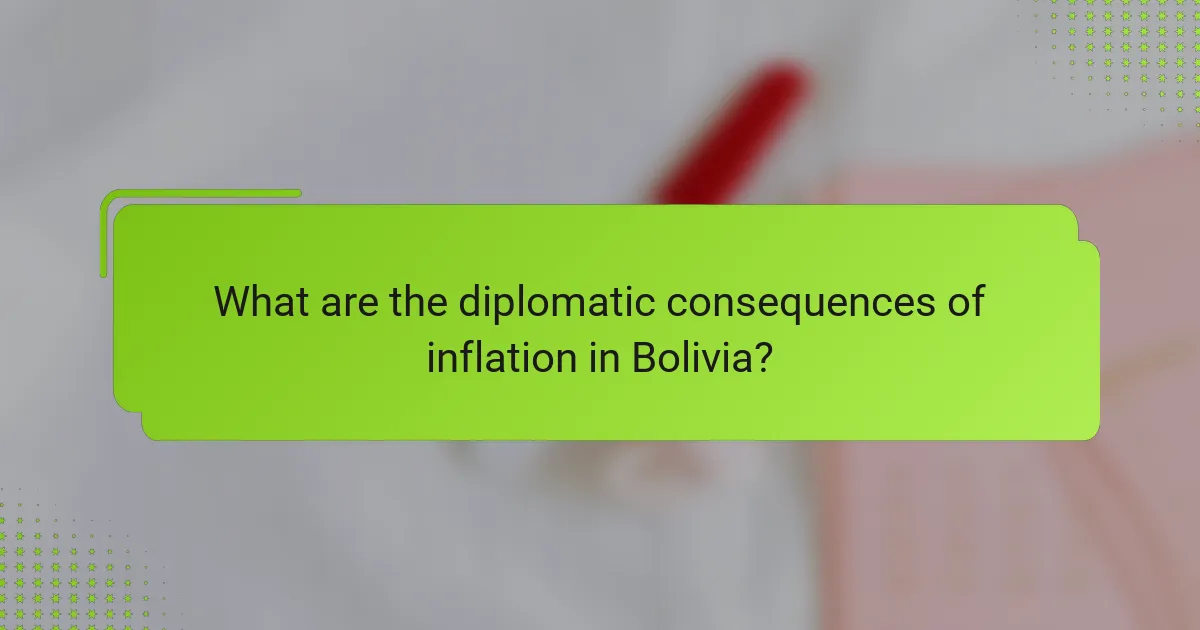
What are the diplomatic consequences of inflation in Bolivia?
Inflation in Bolivia can lead to significant diplomatic consequences, affecting international relations, trade agreements, and foreign aid dynamics. As economic instability rises, the country’s ability to engage effectively on the global stage diminishes, impacting its partnerships and negotiations.
Strained international relations
High inflation can strain Bolivia’s international relations by creating uncertainty and distrust among foreign partners. Countries may hesitate to engage in long-term agreements or investments due to concerns about Bolivia’s economic stability and governance.
For example, nations that previously supported Bolivia may reconsider their diplomatic stance, leading to reduced collaboration on various fronts, including environmental initiatives and regional security. This shift can isolate Bolivia in international forums.
Changes in trade agreements
Inflation can lead to renegotiation or cancellation of trade agreements as Bolivia struggles to maintain competitive pricing for its exports. Countries may seek to protect their own economies by imposing tariffs or seeking alternative suppliers, which can diminish Bolivia’s market access.
In practical terms, Bolivia might find itself needing to adjust its trade policies or seek new partners, potentially shifting from traditional markets in South America to emerging economies in Asia or Africa.
Influence on foreign aid
As inflation rises, the need for foreign aid in Bolivia often increases, but donor countries may become hesitant to provide assistance. Concerns about how aid will be managed and the effectiveness of programs can lead to stricter conditions or reduced funding.
Bolivia may need to demonstrate effective use of previous aid to secure future funding, which can be challenging during periods of economic turmoil. This situation can create a cycle where the lack of aid exacerbates inflationary pressures, further complicating the country’s diplomatic efforts.
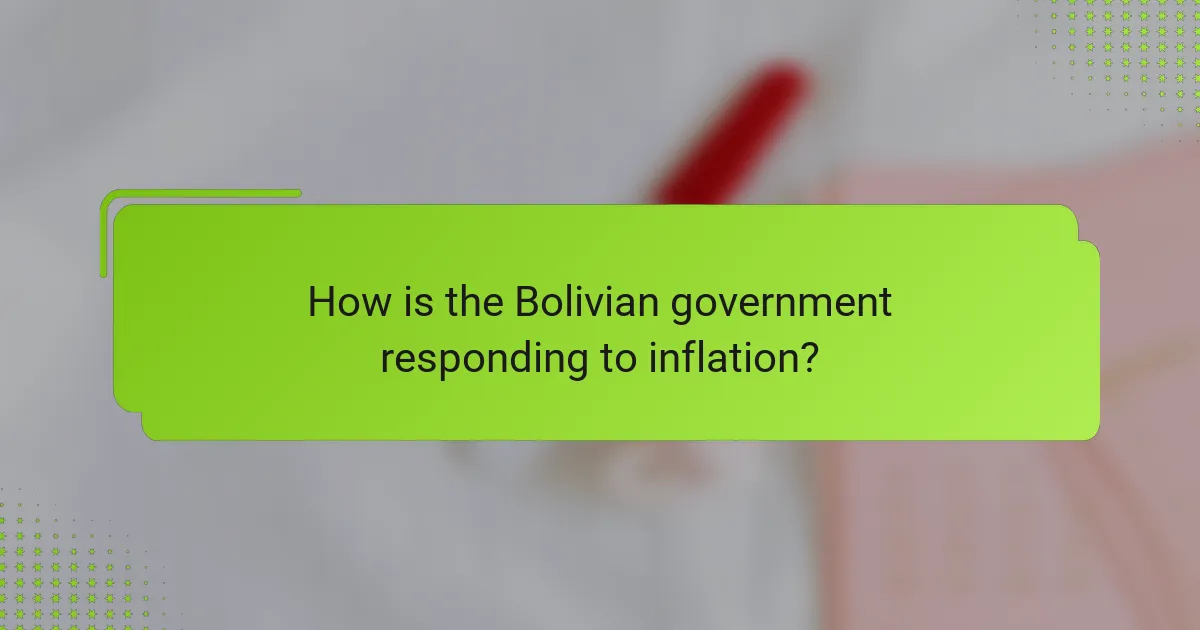
How is the Bolivian government responding to inflation?
The Bolivian government is implementing a range of strategies to address inflation, focusing on policy adjustments, public communication, and economic relief programs. These responses aim to stabilize the economy and maintain public trust amidst rising prices.
Policy adjustments
To combat inflation, the Bolivian government has made several policy adjustments, including modifying interest rates and regulating prices on essential goods. For instance, authorities may set price ceilings on basic food items to prevent excessive increases that could burden consumers.
Additionally, the government is working to enhance fiscal policies by reallocating resources to sectors most affected by inflation. This includes supporting local agriculture to ensure food security and reduce dependency on imports, which can be more susceptible to price fluctuations.
Public communication strategies
Effective public communication is crucial for the Bolivian government as it addresses inflation. Officials are actively engaging with citizens through media briefings and social platforms to explain the measures being taken and the rationale behind them. Transparency helps build trust and reduces panic among the populace.
Moreover, the government is encouraging public feedback to understand the concerns of citizens better. This two-way communication allows for adjustments in strategies based on real-time public sentiment and needs.
Economic relief programs
The Bolivian government has initiated various economic relief programs aimed at assisting those most affected by inflation. These programs may include direct cash transfers to low-income families and subsidies for essential goods, helping to alleviate financial pressure.
Additionally, the government is promoting job creation initiatives and vocational training programs to enhance employment opportunities. By focusing on economic stability and growth, these relief efforts aim to mitigate the long-term impacts of inflation on the population.

What role do social movements play in shaping public sentiment?
Social movements significantly influence public sentiment in Bolivia by mobilizing citizens around common issues, particularly during times of economic distress like inflation. These movements foster a collective identity and amplify voices that might otherwise go unheard, shaping perceptions and attitudes toward government policies and social justice.
Grassroots activism
Grassroots activism in Bolivia often emerges in response to economic challenges, such as rising inflation. Local organizations and community groups mobilize citizens to advocate for their rights, focusing on issues like access to basic goods and services. These movements can include protests, community meetings, and social media campaigns that raise awareness and drive public engagement.
For example, during periods of high inflation, grassroots activists may organize demonstrations to demand government action on price controls or subsidies for essential goods. This activism not only highlights public discontent but also encourages broader participation in the political process.
Influence on policy change
Social movements in Bolivia can lead to significant policy changes by pressuring government officials to address public grievances. When a movement gains traction, it can compel policymakers to consider reforms that align with the demands of the populace, such as adjustments to economic policies or social programs aimed at mitigating the effects of inflation.
Successful movements often utilize strategies like coalition-building and lobbying to amplify their impact. For instance, when multiple organizations unite around a common cause, they can present a stronger front that is harder for the government to ignore, leading to tangible changes in legislation or public policy that reflect the needs of the people.
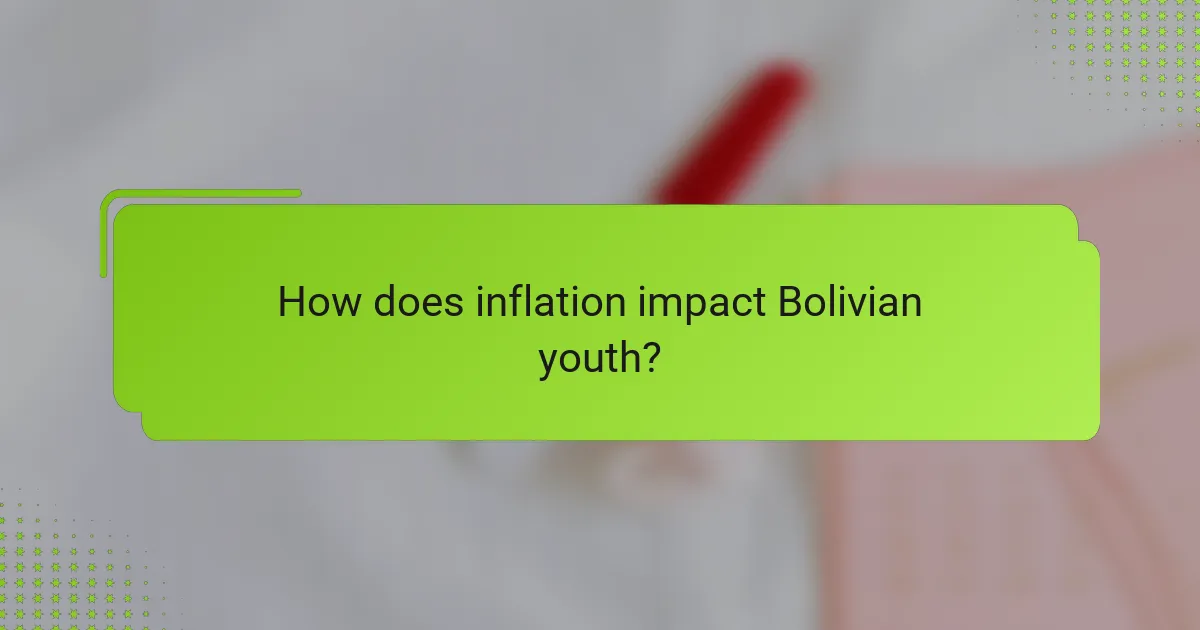
How does inflation impact Bolivian youth?
Inflation significantly affects Bolivian youth by limiting their economic opportunities and access to essential services. As prices rise, young people face increased challenges in securing stable employment and pursuing education, which can hinder their future prospects.
Employment challenges
High inflation creates uncertainty in the job market, making it difficult for Bolivian youth to find stable employment. Many businesses may reduce hiring or even lay off workers due to rising costs, leading to higher unemployment rates among young people.
Additionally, inflation can erode the purchasing power of wages, meaning that even when youth find jobs, their earnings may not be sufficient to cover basic living expenses. This situation often forces them to accept lower-paying or informal jobs, which lack benefits and job security.
Access to education
Inflation impacts access to education by increasing the costs associated with schooling, such as tuition, supplies, and transportation. Families may struggle to afford these expenses, leading to higher dropout rates among youth.
Moreover, as educational institutions face budget constraints due to inflation, the quality of education may decline, further disadvantaging students. Young people may find it challenging to access resources like textbooks and technology, which are essential for their learning and development.
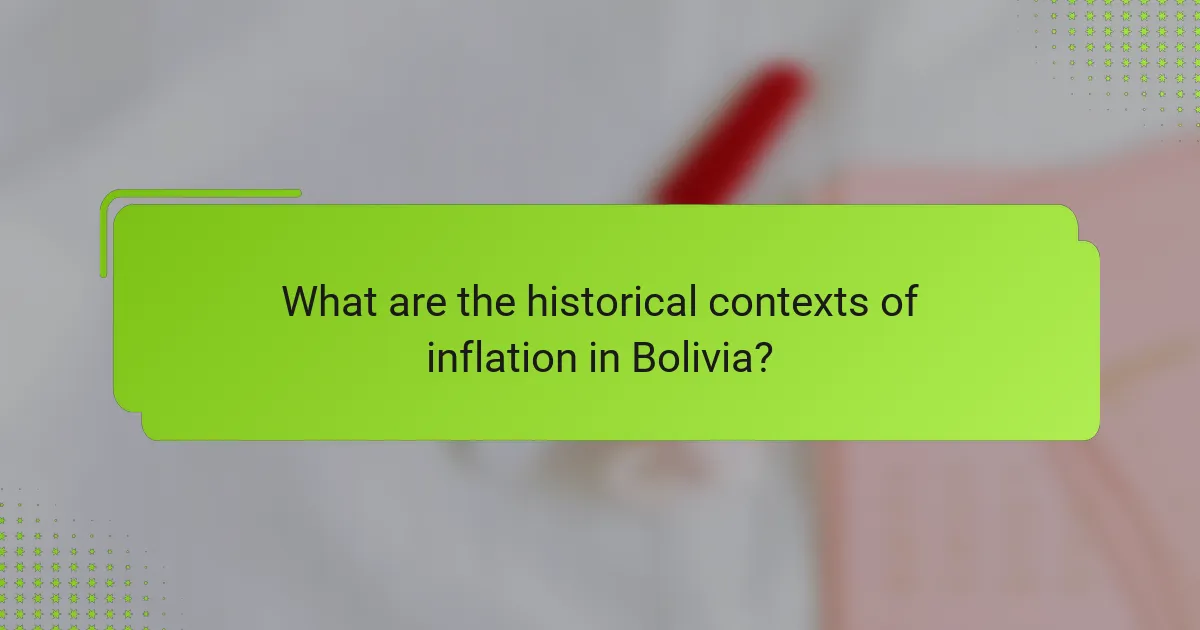
What are the historical contexts of inflation in Bolivia?
Inflation in Bolivia has a complex history marked by periods of hyperinflation and economic instability. Understanding these historical contexts is crucial for grasping current public sentiment and diplomatic relations in the country.
Past economic crises
Bolivia has experienced several significant economic crises, particularly in the late 1980s and early 2000s. During these times, hyperinflation reached staggering levels, with annual rates exceeding 20,000% at its peak. Such crises led to widespread poverty and social unrest, fundamentally altering public trust in government institutions.
The 2000 water crisis in Cochabamba exemplifies how economic hardship can trigger social movements. The privatization of water services resulted in protests that ultimately forced the government to reverse its decision, highlighting the connection between economic policies and public sentiment.
Lessons learned from previous policies
Bolivia’s past experiences with inflation have taught policymakers the importance of maintaining economic stability through sound fiscal policies. For instance, the introduction of the Bolivian Stabilization Fund aimed to manage external shocks and stabilize the economy, reflecting a shift towards more prudent financial management.
Additionally, the government has learned to prioritize social programs that directly address the needs of the population. By investing in education and healthcare, Bolivia aims to build resilience against inflationary pressures while fostering public trust and diplomatic relations with international partners.
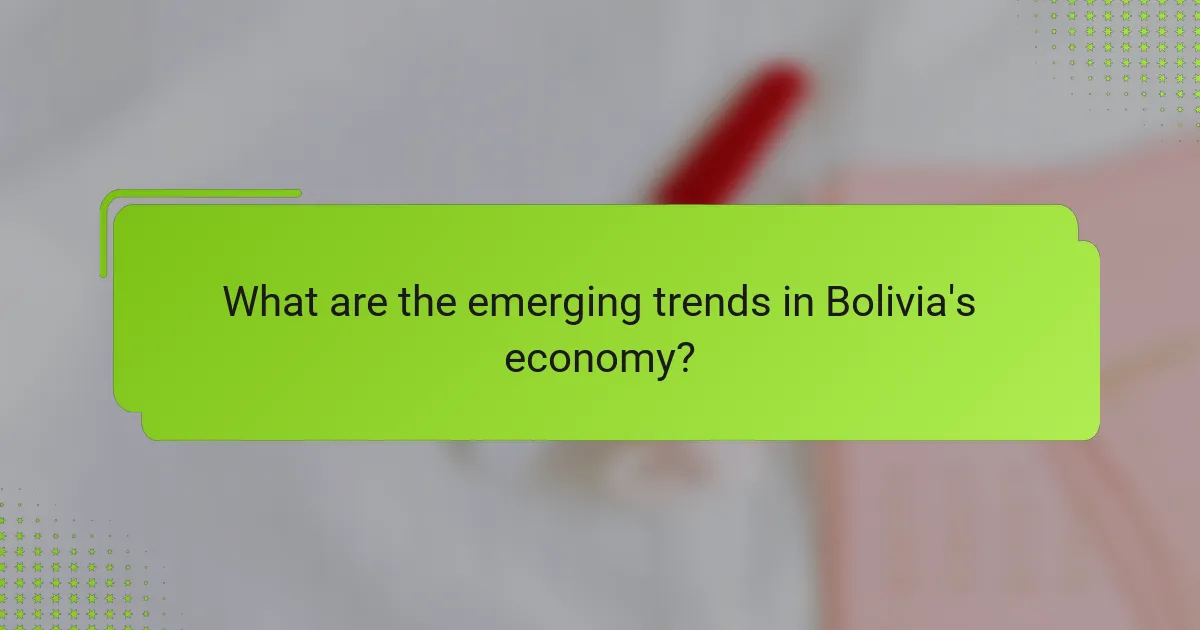
What are the emerging trends in Bolivia’s economy?
Bolivia’s economy is currently experiencing significant shifts, particularly influenced by inflation and the adoption of new financial technologies. These trends are reshaping public sentiment and diplomatic relations as the country navigates economic challenges and opportunities.
Shift towards digital currencies
The shift towards digital currencies in Bolivia is gaining momentum as inflation impacts traditional financial systems. Digital currencies offer a potential solution for individuals seeking stability and security in their transactions, especially in an environment of rising prices.
Many Bolivians are exploring cryptocurrencies as alternatives to the national currency, the boliviano, which has faced depreciation. This trend is fueled by the desire for lower transaction costs and faster transfers, particularly among younger populations and tech-savvy individuals.
However, the regulatory landscape for digital currencies in Bolivia remains uncertain. Users should stay informed about any government regulations and potential risks associated with cryptocurrency investments, including volatility and security concerns. Engaging with reputable platforms and conducting thorough research can help mitigate these risks.
